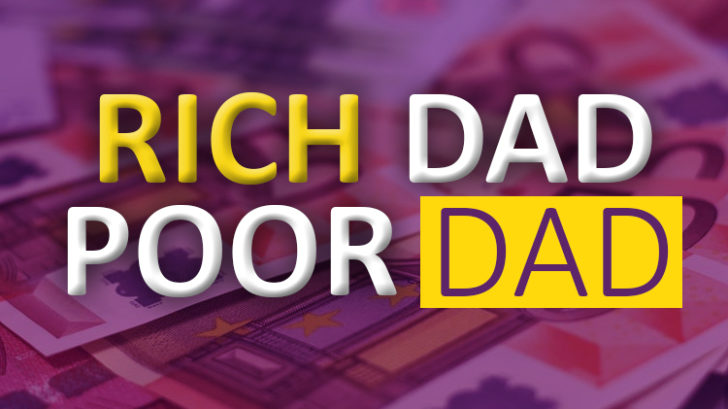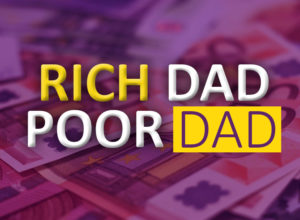“Rich Dad Poor Dad” – best selling finance book deserves to be number 1 as per it’s content. Reading this book literally changed my thoughts about financial literacy.
Here are some of the extracts picked from this book:
> You really wanted to win, but the fear of losing was greater than the excitement of winning. Deep inside, you and only you will know you didn’t go for it. You chose to play it safe.
> “You’d best change your point of view. Stop blaming me and thinking I’m the problem. If you think I’m the problem, then you have to change me. If you realize that you’re the problem, then you can change yourself, learn something, and grow wiser. Most people want everyone else in the world to change but themselves. Let me tell you, it’s easier to change yourself than everyone else.”
Meaning: If we keep the attitude that other one is problem like company not paying much or so, you’ll learn nothing. Instead keep the attitude that I’m the problem and what choices do you have?” – Explore the choices.
> That’s what the other people do. But that’s all they do, waiting for a raise thinking that more money will solve their problems. Most just accept it, and some take a second job working harder, but again accepting a small paycheck.
> My highly educated dad recommended that I do what he did. “Son, I want you to study hard, get good grades, so you can find a safe, secure job with a big company. And make sure it has excellent benefits.” My rich dad wanted me to learn how money works so I could make it work for me.
> So many people say, “Oh, I’m not interested in money.” Yet they’ll work at a job for eight hours a day.
> “You see, we’re all employees ultimately. We just work at different levels,” said rich dad. I just want you boys to have a chance to avoid the trap caused by those two emotions, fear and desire. Use them in your favor, not against you. That’s what I want to teach you. I’m not interested in just teaching you to make a pile of money. That won’t handle the fear or desire. If you don’t first handle fear and desire, and you get rich, you’ll only be a highly paid slave.
> Most people live their lives chasing paychecks, pay raises and job security because of the emotions of desire and fear, not really questioning where those emotion-driven thoughts are leading them.
> A doctor, wanting more money to better provide for his family, raises his fees. By raising his fees, it makes health care more expensive for everyone. It hurts the poor people the most, so they have worse health than those with money. Because the doctors raise their fees, the attorneys raise their fees. Because the attorneys’ fees have gone up, schoolteachers want a raise, which raises our taxes, and on and on and on. Soon there will be such a horrifying gap between the rich and the poor that chaos will break out and another great civilization will collapse.
Lesson – Think. Look for opportunities. Don’t go for big paychecks. The best part was that our business generated money for us, even when we weren’t physically there. Our money worked for us.
=====================
> “Rich people acquire assets. The poor and middle class acquire liabilities that they think are assets,”
> An asset puts money in my pocket. A liability takes money out of my pocket.
> A person can be highly educated, professionally successful, and financially illiterate.
> Schools were designed to produce good employees, instead of employers.
> If my wife and I were to buy a bigger, flashier house, we realize it wouldn’t be an asset. It would be a liability since it would take money out of our pocket. I am not saying don’t buy a house. What I am saying is that you should understand the difference between an asset and a liability. When I want a bigger house, I first buy assets that will generate the cash flow to pay for the house.
> For whom do you work ?
1. You work for the company.
Employees make their business owner or the shareholders rich, not themselves. Your efforts and success will help provide for the owner’s success and retirement.
2. You work for the government.
The government takes its share from your paycheck before you even see it. By working harder, you simply increase the amount of taxes taken by the government. Most people work from January to May just for the government.
3. You work for the bank.
After taxes, your next largest expense is usually your mortgage and credit-card debt.
====================
> The rich focus on their asset columns, while everyone else focuses on their income statements.
> Don’t go for money, go for assets.
> Real assets fall into the following categories:
• Businesses that do not require my presence I own them, but they are managed or run by other people. If I have to work there, it’s not a business. It becomes my job.
• Stocks
• Bonds
• Income-generating real estate
• Notes (IOUs)
• Royalties from intellectual property such as music, scripts, and patents
• Anything else that has value, produces income or appreciates, and has a ready market
=====================
> The reality is that the rich are not taxed. It’s the middle class, especially the educated upper-income middle class, who pays for the poor.
> An employee with a safe, secure job, without financial aptitude, has no escape.
> Rich search for ways to minimize their tax burden. They hire smart attorneys and accountants, and persuade politicians to change laws or create legal loopholes.
> If you work for money, you give the power to you employer. If money works for you, you keep the power and control it.
> Taxes on corporations are less than taxes on individuals – so use corporations as folder to save on taxes. Rich just play the game smarter, and he did it through corporations—the biggest secret of the rich. A corporation can do many things that an employee cannot, like pay expenses before paying taxes. A corporation earns, spends everything it can, and is taxed on anything that is
left. It’s one of the biggest legal tax loopholes that the rich use.
> Business Owners Employees Who Workwith Corporations for Corporations
1. Earn 1. Earn
2. Spend 2. Pay Taxes
3. Pay Taxes 3. Spend
> Each dollar in my asset column was a great employee, working hard to make more employees and buy the boss a new Porsche.
> Many employers feel that advising their workers to mind their own business is bad for business.
==========================
> See students know the answers, yet lack the courage to act on the answer. Often in the real world, it’s not the smart who get ahead, but the bold.
> Financial intelligence is simply having more options.
> The single most powerful asset we all have is our mind. If it is trained well, it can create enormous wealth.
> Which one sounds harder to you?
1. Work hard. Pay 50% in taxes. Save what is left. Your savings then earn 5%, which is also taxed.
OR
2. Take the time to develop your financial intelligence.
Harness the power of your brain and the asset column.
> It is not gambling if you know what you’re doing. It is gambling if you’re just throwing money into a deal and praying.
> Great opportunities are not seen with your eyes. They are seen with your mind.
> Most people never win because they’re more afraid of losing. That is why I found school so silly. In school we learn that mistakes are bad, and we are punished for making them. Yet if you look at the way humans are designed to learn, we learn by making mistakes.
========================
> Job security meant everything to my educated dad. Learning meant everything to my rich dad.
> You want to know a little about a lot.
> Job is an acronym for “Just Over Broke.”
> “Workers work hard enough to not be fired, and owners pay just enough so that workers won’t quit.”
> Life is much like going to the gym. The most painful part is deciding to go. Once you get past that, it’s easy.
> Don’t try to specialize in any thing, try to learn new skills especially like marketing n sales.
======================
> Rich dad believed that the words “I can’t afford it” shut down your brain. “How can I afford it?” opens up possibilities, excitement, and dreams.
> First pay yourself, then others. If little is left for others, that motivates you to get extra.
====================
> The sophisticated investor’s first question is: “How fast do I get my money back?”
> I’d rather have him lose everything now than wait till he’s our age to risk losing everything.
> If we give 100 people $10,000 at the start of the year, I believe that at the end of the year:
• 80 would have nothing left. In fact, many would have created
greater debt by making a down payment on a new car,
refrigerator, electronics, or a holiday.
• 16 would have increased that $10,000 by 5-10 percent.
• 4 would have increased it to $20,000 or into the millions.
“If you want something, you first need to give,”
====================
> Find someone who has done what you want to do. Take them to lunch and ask them for tips and tricks of the trade.
> Take classes, read, and attend seminars.
============
> If you know what you’re doing, investing is not risky. It’s just common sense.”
> The key to financial freedom and great wealth is a person’s ability to convert earned income into passive and/or portfolio income.
3 types of money:
a. Earned
b. Passive
c. Portfolio
Go for passive and portfolio not earned. Earned income is money you work for, and passive and portfolio income is money working for you.
Next read in series is book from same author Cashflow Quadrant

